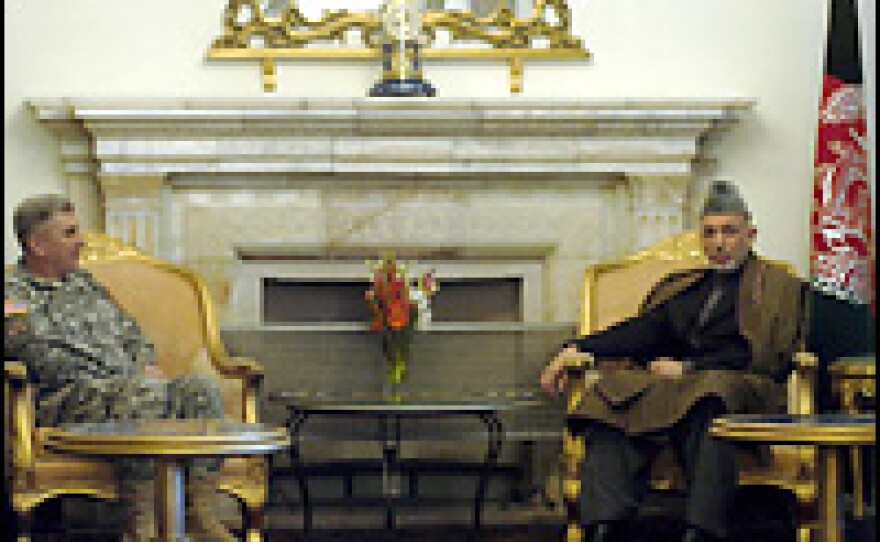
Afghanistan remains a dangerous place, but a former commander of U.S. forces there says progress is being made as the country's weak government slowly extends its reach. Lt. Gen. Karl Eikenberry reviews the war in Afghanistan with Steve Inskeep.
Do Taliban forces pose a military threat in Afghanistan?
The Taliban military forces remain a much weaker enemy. Whenever the Taliban masses on the battlefield, those Taliban forces are defeated, always in very short order.
If the Taliban is not a significant military threat, then what is the challenge in Afghanistan?
We may have underestimated the amount of investment that would be needed in the country, which has got an extraordinarily difficult topography, several generations without education, several generations that knew nothing except the rule of [the] gun, that had not seen the rule of law. This is a generational effort.
When you say, "long-term conflict, trouble building a state, problems with corruption," some people will ask, is this on its way to being another Iraq?
It's on the steady path, right now ... to, I believe, success.
Is the situation in any way comparable to Iraq at this time?
No. Afghanistan is Afghanistan; Iraq is Iraq. They're two very different campaigns.
Even though insurgents in Afghanistan are borrowing tactics from insurgents in Iraq, or so it seems?
I haven't served in Iraq. Here's how I'd categorize Afghanistan, though, [it's a] question of not a strong enemy ... the challenge has been building the state of Afghanistan, extending the writ of governance. That has been a very steady growth of progress that we've had with the government of Afghanistan over the last six years.
Would you say that more of the country is secure and under the control of the central government than a few years ago?
Absolutely. Now, you'll say, paradoxically, how is that possible? There's been more incidence of violence, so how is [it] that there's more control now?
It's as the government of Afghanistan ... continues to advance into its own ungoverned spaces that there are places in those ungoverned spaces where ... Taliban influence, criminal influence, has increased. And so there's fighting as the government advances. It's a battle for ungoverned space.
I want to ask about a difference, perhaps, between the U.S. approach in Afghanistan and Iraq. In Iraq right now there's an increase in U.S. troops, by the tens of thousands, as well as an increase in reconstruction money. In Afghanistan there's also an increase in some troops, but it's much more a question of trying to spend more. Why focus more on the money?
Well, in Afghanistan, if the paradigm is not a strong enemy but a weak state, it makes great sense for further investments.
To give an example, we had a stretch of road, about 50 miles long. We had 50 improvised explosive attacks along that road. We went in and we improved that road. We've cut the travel time from 12 hours to two hours. Now you've got gas stations, now you've got health clinics and schools. Since we've improved that road, there has not been one improvised explosive device attack.
So, we could defend that road with 1,000 troops and keep it the way it was, or we can make an investment to improve the road. And now the Afghans are defending it.
Is there a limited amount of time before Afghans get tired of so many foreigners running around their country and simply want you out?
Well, that's a great question. The Afghans have been through 30 years of warfare. They still realize that if the international community leaves at this point, they will return to violence among themselves, and the hellhole that Afghanistan became.
So, I wouldn't say that time is necessarily against us. If we mismanage the campaign in Afghanistan, if the Afghans themselves don't stand up to their daunting challenges ... time could start to work against us.
But still today, I think we're making significant enough progress that time's with us and with the Afghans.
In your almost two years in command in Afghanistan, can you recall any time that you knew where Osama bin Laden had been at some point?
No. No. Steve, if we go back to the time of [2001, yes], but subsequently no, we do not know where bin Laden is.
Copyright 2022 NPR. To see more, visit https://www.npr.org. 9(MDAzMjM2NDYzMDEyMzc1Njk5NjAxNzY3OQ001))





